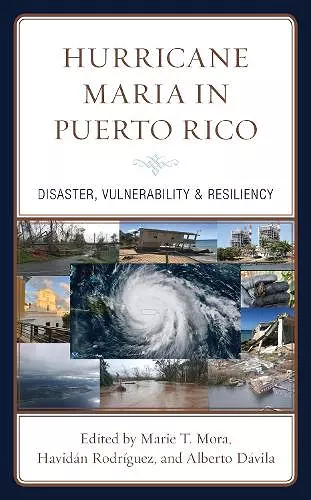Hurricane Maria in Puerto Rico
Disaster, Vulnerability & Resiliency
Marie T Mora editor Havidan Rodriguez editor Alberto Dávila editor
Format:Hardback
Publisher:Lexington Books
Published:30th Sep '21
Currently unavailable, and unfortunately no date known when it will be back
This hardback is available in another edition too:
- Paperback£30.00(9781793603098)

With its 155 mile-per-hour sustained windspeeds, the near-Category 5 Hurricane Maria brought catastrophic devastation and destruction as it diagonally crossed the Commonwealth of Puerto Rico from the southeast to the northwest on September 20, 2017. The official death toll estimate of 2,975 lost lives means this record storm became one of the most devasting hurricanes not only for Puerto Rico but for the U.S. Many of these deaths, as well as the prolonged human suffering, were attributed to what was described as inadequate disaster response and slow restoration of basic services (including running water, electricity, and the provision and distribution of food and medicine), and not to the direct impact of the hurricane itself.
At the same time, Hurricane Maria made landfall when Puerto Rico had been confronting a severe economic crisis surging for over a decade. This crisis, referred to as La Crisis Boricua, was characterized by a significant loss of industry and jobs, a deteriorating infrastructure, record net outmigration, a shrinking and rapidly aging population, rising healthcare under-coverage, a bankrupt government, and federal legislation restricting fiscal policy decisions made by elected officials on the island. Thus, Hurricane Maria exacerbated the effects of La Crisis Boricua on the socioeconomic, health, and demographic outcomes affecting Puerto Ricans on the island and U.S. mainland.
Bringing together scholars from a wide variety of disciplines (including economics, sociology, demography, health, psychology, disaster research, political science, education, the arts, and others), this volume represents one of the first interdisciplinary sets of studies dedicated to analyzing the effects of Hurricane Maria on island and stateside Puerto Ricans. Specific topics cover Hurricane Maria’s impact on labor market outcomes, including wages and employment by industry; health implications, including mental health; changes in artistic expression; civic engagement; and disaster response and recovery. A common thread through many of the chapters was the destruction of Puerto Rico’s electrical grid and the prolonged restoration of electricity and other essential services that resulted in the loss of thousands of lives.
Hurricane Maria in Puerto Rico provides one of the most comprehensive, clear and rigorous analysis of the impact of hurricane Maria on the lives of Puerto Ricans.
Unlike similar volumes, this collection of both well established and younger scholars provides welcomed, alternative, serious, well documented, and empirically substantiated reflections on the Puerto Rican experience in the aftermath of a series of catastrophic events amplified by hurricane Maria.
-- Charles R. Venator-Santiago, University of ConnecticutHurricane María was a natural disaster that turned into a humanitarian crisis in Puerto Rico as a result of antecedent conditions and exacerbated by the post-disaster response. Hurricane Maria in Puerto Rico: Disaster, Vulnerability and Resilience provides a succinct but detailed broad-scope account and analyses of such antecedent conditions, consequences of the storm and human action, and responses, both inadequate and successful. It also offers useful and actionable policy recommendations from keen observers and practitioners of the Puerto Rican experience. This volume serves as required reference for the present Puerto Rican reality and those engaged in disaster attenuation and management.
-- Carlos Vargas-Ramos, Columbia UniverISBN: 9781793603074
Dimensions: 228mm x 161mm x 24mm
Weight: 567g
246 pages